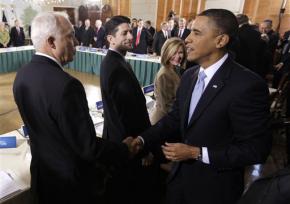Do not resuscitate the “public option”
, a member of Physicians for a National Health Program and steward in the Public Employees Federation in New York, argues that it's wrong to push for a "public option" now that Barack Obama is trying to restart health care legislation.
LIKE INITIATING CPR on a patient who was dead in the field and remains dead on arrival, the effort to resuscitate the "public option" is mistaken--and futile.
Once upon a time, proponents of the "public plan option" sought a "Medicare-like" program that might enroll every other person in the nation, and thus run private insurers out of business.
"A roadblock to reform," cried the insurance companies. As a result of this complaint, nothing in the bills passed by the House and the Senate proposed to erect a public insurer that would possibly influence the insurance market.
The House bill included a feeble "public option"--a government-sponsored insurance plan to start in 2013 that would enroll perhaps 2 percent of the nation by 2019. The Senate bill simply nixed the idea. The president, in his latest proposal, also abandoned the "public option."
But the "public option" was never little more than a K Street phrase, a shadow puppet, a political posture. All along, proponents of adding a new government-sponsored insurer boasted talking points, but never offered workable health reform.

In fact, the "public option" has already been tried in Maine--and failed. A "public option" insurer, DirigoChoice, was established in Maine in 2003. Despite years of trying, it failed to enroll all but a tiny fraction of the uninsured; could not reduce the costs of insurance or health care; did not reduce overall health spending; and did not lessen disparities in care. Last year, DirigoChoice tanked.
But the insurance companies oppose the "public option," and that proves its virtue, its supporters exclaim.
Hello? Of course the insurers oppose it.
Why would the insurance corporations willingly yield even 2 percent of the market to a public plan (House bill) when they've been given the "option" (Senate bill and now the president) of keeping 100 percent of the market? And why would the insurance companies not fight for the whole pie when the White House earlier let slip that it saw the "public option" as simply a bargaining chip in private deal-making?
BUT THERE is something else here. The "public option" is not even a good idea, let alone "progressive."
A corporate oligopoly of huge insurers, with near-monopoly control in most locales, dominates the insurance market in the United States. A government insurer of any size would simply add yet another bureaucracy to the present byzantine, corporate insurance mess.
Does it really make any sense to think that a government plan could give the private insurance companies a run for their money--within the contemporary corporate marketplace--without draconian regulation imposed on the industry?
The insurance market cannot be tricked into reforming itself. The health insurance company that wins in the marketplace avoids or jettisons sick and poor patients and enrolls the healthy and the wealthy--and a "public option" will not change this fact. The market that serves the private interests--profiteering at the expense of the sick--would continue to do so.
The proper name for this kind of "market magic" is "the race to the bottom." Adding a public plan into the private mix cannot and will not change the character of this cruel game.
Any successful "public option" insurance plan would wind up covering the sick and the poor. It would be designed to lose, not win, the market competition. It would not prove affordable or comprehensive. Worst of all, a highly successful "public plan option" could put our nation on a fast-track to permanent two-tiered health services, exacerbating deplorable disparities that plague us.
Regrettably, the fact that the "public option" has gained so much attention shows how deeply our culture has surrendered to neoliberal ideology, the ideas popularized by Ronald Reagan. It is a lie that the market will always provide, especially when it comes to health care.
So why would some of our friends still seek to revive the false promise of the "public option"?
The University of Pennsylvania professor Marie Gottschalk, in a remarkably prescient article in Morbid Symptoms: Health Under Capitalism (the 2010 Socialist Register), identified the psychology at work. Gottschalk compared health reformers in the U.S. to victims of the Stockholm Syndrome, in which hostages learn to identify with--and even defend--their hostage-takers.
We ought to reach out with sympathy to our friends who have fallen captive to Ronald Reagan ideology and say: "Do not resuscitate the 'public option.'"
It is time to let go. All along, adding a feeble public insurance plan to the insurance market has been a lame and withering excuse to support "insurance reform" that will criminalize the uninsured, divert billions of tax dollars to subsidize unaffordable private insurance premiums and protect pharmaceutical industry super-profits.
Another world is still possible. It is called Medicare-for-all, expanded and improved. Single payer is the minimum increment of change we need in order to improve health care in the United States.
An earlier version of this article was published at the Progressive Media Project, the Albany Times Union City Brights blog and elsewhere.


